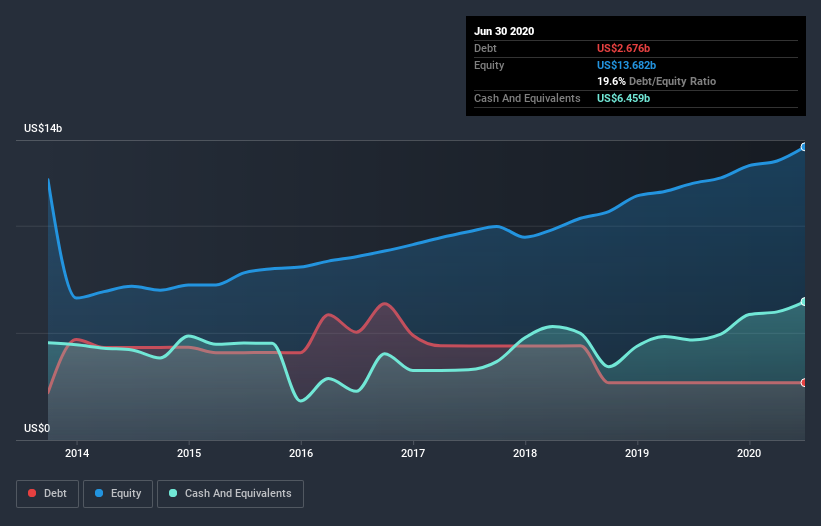Activision Blizzard (NASDAQ:ATVI) Could Easily Take On More Debt

Warren Buffett famously said, 'Volatility is far from synonymous with risk.' When we think about how risky a company is, we always like to look at its use of debt, since debt overload can lead to ruin. Importantly, Activision Blizzard, Inc. (NASDAQ:ATVI) does carry debt. But should shareholders be worried about its use of debt?
Why Does Debt Bring Risk?
Debt and other liabilities become risky for a business when it cannot easily fulfill those obligations, either with free cash flow or by raising capital at an attractive price. In the worst case scenario, a company can go bankrupt if it cannot pay its creditors. However, a more frequent (but still costly) occurrence is where a company must issue shares at bargain-basement prices, permanently diluting shareholders, just to shore up its balance sheet. Of course, plenty of companies use debt to fund growth, without any negative consequences. When we examine debt levels, we first consider both cash and debt levels, together.
See our latest analysis for Activision Blizzard
How Much Debt Does Activision Blizzard Carry?
The image below, which you can click on for greater detail, shows that Activision Blizzard had debt of US$2.40b at the end of June 2020, a reduction from US$2.67b over a year. However, it does have US$6.46b in cash offsetting this, leading to net cash of US$4.06b.
How Strong Is Activision Blizzard's Balance Sheet?
The latest balance sheet data shows that Activision Blizzard had liabilities of US$2.56b due within a year, and liabilities of US$3.98b falling due after that. On the other hand, it had cash of US$6.46b and US$614.0m worth of receivables due within a year. So it actually has US$535.0m more liquid assets than total liabilities.
Having regard to Activision Blizzard's size, it seems that its liquid assets are well balanced with its total liabilities. So it's very unlikely that the US$61.0b company is short on cash, but still worth keeping an eye on the balance sheet. Simply put, the fact that Activision Blizzard has more cash than debt is arguably a good indication that it can manage its debt safely.
Fortunately, Activision Blizzard grew its EBIT by 10.0% in the last year, making that debt load look even more manageable. When analysing debt levels, the balance sheet is the obvious place to start. But it is future earnings, more than anything, that will determine Activision Blizzard's ability to maintain a healthy balance sheet going forward. So if you want to see what the professionals think, you might find this free report on analyst profit forecasts to be interesting.
Finally, a company can only pay off debt with cold hard cash, not accounting profits. Activision Blizzard may have net cash on the balance sheet, but it is still interesting to look at how well the business converts its earnings before interest and tax (EBIT) to free cash flow, because that will influence both its need for, and its capacity to manage debt. Happily for any shareholders, Activision Blizzard actually produced more free cash flow than EBIT over the last three years. There's nothing better than incoming cash when it comes to staying in your lenders' good graces.
Summing up
While we empathize with investors who find debt concerning, you should keep in mind that Activision Blizzard has net cash of US$4.06b, as well as more liquid assets than liabilities. And it impressed us with free cash flow of US$2.0b, being 101% of its EBIT. So is Activision Blizzard's debt a risk? It doesn't seem so to us. When analysing debt levels, the balance sheet is the obvious place to start. However, not all investment risk resides within the balance sheet - far from it. Case in point: We've spotted 1 warning sign for Activision Blizzard you should be aware of.
If, after all that, you're more interested in a fast growing company with a rock-solid balance sheet, then check out our list of net cash growth stocks without delay.
This article by Simply Wall St is general in nature. It does not constitute a recommendation to buy or sell any stock, and does not take account of your objectives, or your financial situation. We aim to bring you long-term focused analysis driven by fundamental data. Note that our analysis may not factor in the latest price-sensitive company announcements or qualitative material. Simply Wall St has no position in any stocks mentioned.
Have feedback on this article? Concerned about the content? Get in touch with us directly. Alternatively, email editorial-team@simplywallst.com.

